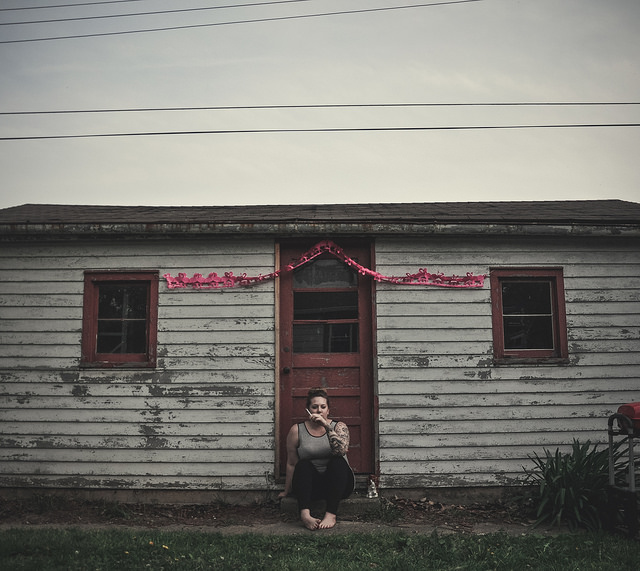
This is a big one, right?
The fear of abandonment can feel like a ominous cloud that follows us around, sometimes from a very young age, or due to situations that occur later in life—sometimes, more often than not, both.
It can be crippling.
If can feel debilitating and desperate.
“Please, don’t leave me.”
If we are in relationships, this can present itself in many different ways. We can distance ourselves and not get too close, or we can grip and force and beg at times for even subtle signs of validation that we are walking on sturdy ground.
Sometimes, this can be so strong that it prevents us from engaging in relationships at all. We fear even the risk of this happening again, especially if particularly traumatic feelings linger like a threatening ghost from our relationships past.
For me, personally, this has been one of the biggest challenges of my life.
I remember feeling this way as a child, although I did not really understand it at the time. I was never as close with my parents as many other children were, and without going into detail, I will just say that this was a big part of growing up.
Decades later, I found myself making certain that I was the one doing the abandoning first in some relationships, or feeling abandoned—including going through two pregnancies mostly on my own.
It was during this time that I really started to explore this.
What was my role in this?
Clearly I played a part. I chose those relationships, even though my partners had their own free will, and I now believe that this is something that I am grateful to have experienced and learned.
I do not want to judge others to whom this has happened, nor do I want to feel as if I was a victim.
We can not feel like victims and be empowered at the same time, so I have tried to take on the role of observer in my own life in an effort to break this cycle of relationship dynamics.
Abandonment happened when I least expected it. I had done a lot of work on myself and thought I was in the clear as I had realized a certain level of independence, self awareness, and even felt a certain amount of freedom.
This type of abandonment shut down my entire world for quite a while. It came out of nowhere. “Trust me,” he had repeated—over and over, and after a long time, I did. I felt safe that a disappearing act was nowhere in our immediate horizon.
It happened right when things felt solid—he bailed. It felt as if the rug had been pulled from my feet and I landed hard on my sacrum.
Those of us who struggle with this specific fear know that we have the tendency to not just feel the effects of our current situation, but our collective experiences of abandonment, like a tidal wave which threatens to drown us.
Since then, with the support of some amazing friends, teachers, healers, but most importantly myself, I have come to a healing realization.
My fear of abandonment from others was really my fear of abandoning myself.
As a child, I did not yet have this wisdom. I read books, I wrote, I would draw and do my best to appear confident and conformed to social expectations, but I struggled.
As an adult, I get to choose.
I get to choose my relationships, but much more importantly I get to choose my response to relationship dynamics. I had a fear of losing myself in a relationship, I had a fear of codependency, and I had a fear of abandonment, which contributed to my not fully living or loving.
This fear of abandonment crumbled mostly when I stood true in myself after that unexpected situation. I cried, I processed, I was honest about how I felt with my friends and finally—I did not abandon myself.
I did not lose myself. I did not allow his fears and actions to affect my self-worth as, admittedly, I had done before when similar situations had occurred.
If we vow to always stay with ourselves, we do not have to feel the desperate need for others to stay with us. Commitment can be a beautiful thing, but true and healthy commitment comes from a place of love, joy, want and desire.
The fear of abandonment stems from the unhealthy perspective of need and lack, and a true healthy and loving commitment cannot exist fully if this fear is present, like a virus in the relationship. This virus implant itself, and actively or passively, can cause even the strongest and stable relationships to implode.
This fear still comes up for me from time to time, but now that I understand that it is mostly stems from a lack of trust for myself, it’s easier to disengage and not act on it.
I see it, and I see it for what it is.
I trust myself now to not abandon myself.
If people want to leave a relationship, that is their choice.
It is our choice in how we react, or better yet—choose to respond.
Choosing to remain with yourself during the toughest of times can be difficult.
Choosing to stay centered, to do things that feel good for you, to process and listen to emotions, and to choose a perspective that we know to be true and self-loving, is how to prevent perceived wounds from becoming scars or emotional disabilities.
This is power. Real power, which no other person can take away from us.
We can choose not to abandon ourselves, to nourish ourselves in healthy ways. We can choose to recognize our own self-worth, and not allow the projections of another to take away from it.
We can know with certainty and realize that we exist, therefore, we are worthy.
Months later, he contacted me and wanted to see me. Intuitively, I knew this was coming and I did meet with him for tea. He genuinely apologized and said that he felt terrible about what happened and that he had let both of us down greatly. I recognized that it took a lot of strength for him to do this and told him that I forgave him. I gave him a hug and sincerely wished him well.
I felt a release after this happened. I truly appreciated the apology, even though it was not required for my healing. I believe that the release I felt was as a result of his releasing his own burden, which was made possible by my forgiveness.
We can love ourselves during these situations, yet still provide grace for “the other,” no matter the situation.
Most importantly though—we can forgive both ourselves and them for any perceived abandonment, stand tall, and walk steadily toward love—within ourselves, and for future possibilities with another.
Relephant Read:
Why did You Leave Me? 3 Tips for Getting Over Abandonment.
Author: Katie Vessel
Editor: Catherine Monkman
Photo: Holly Lay/Flickr







Read 20 comments and reply